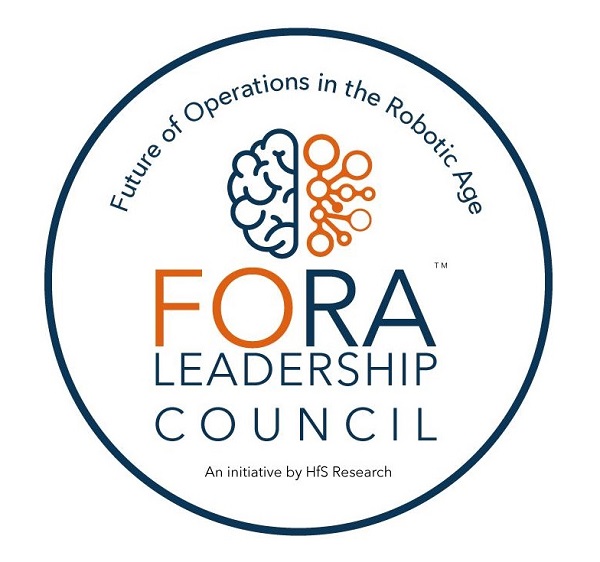HfS recently hosted the debut session of the newly-formed Future of Operations in the Robotic Age Leadership Council (FORA) in Chicago. The purpose was to bring together stakeholders across all corners of enterprise operations, services and intelligent automation software arenas to lock heads and map the course of this emerging industry: business operations being fundamentally redesigned by the impact of intelligent automation and digital technologies. We believe this is becoming known more broadly as the “digital operations industry”. So let’s hear the consolidated feedback from the industry’s key stakeholders:
The FORA Mandates, Q4 2017
1) Automation technologies can collapse the barriers between front and back offices
While there’s a lot of noise and scaremongering in the public sphere around job losses, the real story is that automation technologies of various flavors and deployments — RPA, RDA, AI, etc. – are quietly creating a new execution layer on top of the IT “stack,” one that offers a flexible, reconfigurable operations platform for the business. Freed from the costs and rigidity of legacy systems, savvy enterprise architects see automation technologies, together with the data they capture and generate, as a way to digitally connect their back-, middle-, and front-offices for greater throughput, quality, and responsiveness.
2) Commercials of engagements must be reconstructed around the economic value of robots
Automation is destroying the traditional FTE-based cost/value equation for service delivery, and we need a new “post-FTE” commercial model, one based on partnership, business outcomes and joint value creation for buyers, advisors, and provides. The economic value of a robot is vastly different in kind, cost and scale from that of a human being, and is forcing us to rethink the value of different kinds of work – separating rote transaction work from judgment-based work. Ultimately, this will require all parties to re-think their offerings and value propositions and to demonstrate imagination, creativity and flexibility, while educating their respective stakeholder communities and managing the financial and human impacts.
3) From the C-Suite to the manager, enterprises need people who appreciate and understand the value of data
Success in achieving the OneOffice future requires a blend of strategy, business design, and technology skills to re-think and re-configure core processes with a singular focus on improving the customer experience v. just cutting costs. Automation per se looks deceptively simple (and is often sold with that promise) but can fail to deliver true value if simply retrofitted on existing processes; coupled with artificial intelligence and cognitive, automation can support new services and capabilities at speed and scale. But thoughtful tool selection and disciplined deployment is crucial. And as data grows exponentially, it becomes the essential raw material for every enterprise in every industry. At every level of the organization – from the C-Suite to manager – enterprises need people who appreciate and understand the value of data and who can identify/extract the most important customer-relevant insights.
4) Businesses must be redesigned from a logical rather than physical perspective
Native digital businesses have demonstrated the value and power of a digital operations approach by thinking about their business from a logical rather than physical perspective – focusing on customer outcomes rather than internal inputs. They begin with an intense focus on identifying their customers’ most important ‘priorities’ (as distinct from ‘needs’) to design a differentiated and dynamic customer experience. They then build and optimize a collaborative partner ecosystem to deliver that experience, leveraging specialist capabilities and resources. The result is a more disaggregated but fiercely cooperative business model. The challenge for non-digital natives is to re-imagine their businesses from this logical perspective and to demonstrate what one executive called the “willingness to let go.” That implies – and requires – a fundamental re-thinking around control and governance as well as motivation and reward, supported by deep and enduring commitment to change management.
Download your complimentary copy of the full debrief from the inaugural FORA summit here
I hope to see many of you in London on 7th December for our next round of pivotal discussions. A big thanks to all of you for your terrific support with the FORA Leadership Council initiative,
Cheers,

Posted in : Cognitive Computing, Robotic Process Automation, Sourcing Best Practises






